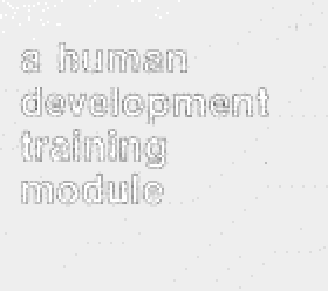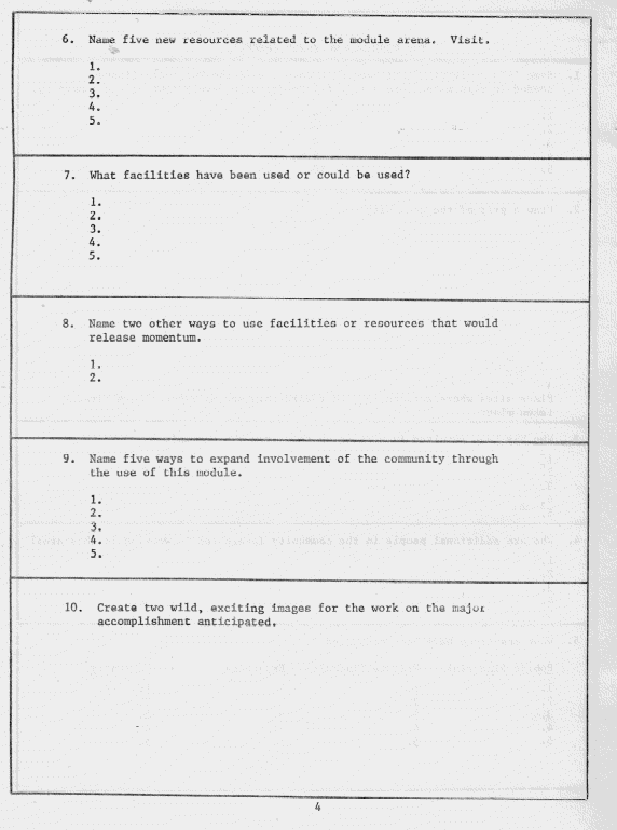
s


Introduction 1
I. MODULE PREPARATION 2
A. Research Workshop 2
B. Participant Recruitment 5
C. Module Leadership 6
D. Practical Arrangements 8
II. MODULE DESIGN 10
A. Module Overview 11
B. Field Visit 14
C. Implementation Talk 17
D. Resource Panel 20
E. Implementation Workshop 23
F. Participant Evaluation 27
Bibliography 30
The Human Development Training Modules were developed by the Institute of Cultural Affairs for use in "he Human Development Projects around the world. The module is a vehicle for releasing effective coordinated action in specific arenas of a community's life. These one day events are designed to equip participants with both an overall grasp of the arena as well as practical methods for catalyzing its rapid development in the community. The residue, however, of a one day course is more a set of practical resolutions than it is a set of refined skills. Modules bridge the gap between envisioned accomplishments in arenas of community need and the action needed to achieve those goals. They blend education and implementary planning into a unique package which trains participants in how to move effectively in their own particular situation, while simultaneously offering them methods to move in any situation. They mobilize both concerned local residents and related resource people in specific programs. Modules are designed to attack limited vision and paralyzed motivation at the local level. They are most effective where a clear need and consensus to move on a project already exist in a community, but where actual movement is frustrated. 1his manual is designed as a tool for leaders of Human Development Training Modules to use in setting up and preparing to teach modules in local communities.
Community and neighborhood leadership benefit by
participation in the module in many ways. Community people who
attend the module receive practical suggestions, renewed motivity,
fresh sources of assistance and a concrete plan for the module
arena. The module arena is selected because a significant accomplishment
in this dimension will catalyze broad, sweeping change in the
community. In order for such changes to occur in a local community,
the leadership must see the task with new eyes, to remove past
prejudice and reduced goals and broaden ideas about future opportunities.
The following workshop is intended for use by the
module trainer with project leadership during the week prior to
the module to begin the process of considering fresh approaches.
The purpose of this workshop is to state the significant accomplishments
that have already happened locally in the module arena, locate
the current blocks preventing further progress and name the necessary
action that would facilitate visible change in three month's time.
I. HISTORY
What would you consider to be a significant accomplishment in the module arena?
What specific actions have been completed so far?
What individuals from the community, local agencies and the surrounding region have been involved in this work?
What would you say have been breakthrus, or new insights
in this area?
II. CURRENT BLOCKS
In what areas have you run into blocks?
What seems to slow down progress?
What is the single obstacle which if dealt with would
catalyze the community's development?
III. THE "LEAP': (significant accomplishment
in the module arena for catalyzing broad D sweeping change in
the community.
What do you want to have happen to the community by the end of the month?
What are the key accomplishments that would occasion a "leap"?
How can the module enable this?

The module is designed to serve a diverse audience.
To ensure that invitations are extended to a comprehensive list
of potential participants list 10 names under each of the following
categories:
1. Local residents who work in the module arena
2. Persons from the metropolitan area, county and
state, who work in the arena both in public and private agencies.
3. Volunteer consultants and financial supporters
of the community project.
4. Other local residents who are concerned with their
community's development.
After getting out a comprehensive list of potential
participants, determine how these people will be invited. Some
can be sent invitations by mail with a phone call followup
while others may need a personal visit. Followup by personal
visits and telephone calls are necessary to answer questions,
provide additional information and secure definite registrations.
Publicity materials can be designed to reach a broader audience.
News releases can be placed in local papers to give a brief description
of the module and enrollment procedures. Fliers can be designed
for mass distribution to provide information on the day. Doortodoor
visitation within the local community can be organized through
block clubs or other local organizations.
Adequate leadership of Human Development Training
Modules requires a team of people with various skills to fill
the basic roles throughout the day. Since an important aspect
of the training involves communicating corporate methods that
allow diverse people to work effectively together, the demonstration
of the leadership team's working together is crucial. One overall
coordinator familiar with Human Development Projects and skilled
in workshop methods is needed to orchestrate the day and, where
necessary, to train others for specific roles. One or two people
with direct experience in Human Development Projects are required
to do the two talks and to serve as resource people. It is preferable
for one of these to be from outside the host community because
of the objectivity and fresh insights possible from other experiences.
One or two people from local communities (not professionals or
staff, just local leaders) are also needed. At least one of these
needs to be from the host community to serve as emcee for the
day. This would be a basic team of 35 people. Prior to the
module this team would meet to make assignments to cover the following
roles: Host, Module Overview, Field Visit, Implementation Talk,
Panel Moderator and Workshop Leader. An important aspect of this
team is that it illustrate a range of role models including effective
orchestrator, local leadership and resource staff adequate to
the perspectives of the participants. In addition to this core
team, additional people will be needed (depending on the size
of the module) to lead field visits, subgroup discussions and
to serve as resource and practice staff.
The following are the specific tasks required for
each of the assignment roles:
Host: A community leader welcomes people to the module
and the project site.
Module Overview: This talk covers the whole module
arena and is done by the coordinator.
Field Visit: Community residents host module participants
for the field visit. If the group is large, they break into groups
of about twenty to facilitate the tour.
Implementation Talk. This talk is a testimony to
the possibility of developing the module arena in any community,
preferably done by a local resident who has been actively engaged
in the project.
Panel Moderator. A member of the project staff introduces
the panel and makes sure that all questions are adequately answered.
This person should have questions on hand to keep the dialogue
moving.
Workshop Leader: This role may be played by anyone
with workshop training and experience to create the plan that
will be done by the community.
Lunch Preparation and Room Setup: These practical
tasks are done by local residents and Project staff.
1. Space Design
A meeting space which will accommodate 4060
persons is needed. Criteria to be considered in the selection
are.
1. Adequate space to seat anticipated participants
around tables.
2. A central location to facilitate the tour of the
community in the morning session.
3. Easy access to a meal preparation and/or service
area.
4. Free use of the space or minimal rental fee.
5. A location to which all residents of the community
will be willing to come.
Equipment and materials which are needed include:
1. Tables
2. Chairs
3. Blackboard, chalk, erasers
4. Butcher paper
5. Magic markers
6. Masking tape
7. Paper and pencils for participants
Community map
Local symbols (e.g., community logos, flags)
Photos of the community (before and after)
Display of any industrial/commercial products
Global map with other Human Development Projects marked on it.
9. Name tags
10. Ash trays
11. Food service equipment
12. Plastic garbage bags
2. Food Service
A hot lunch is served as a part of the module design.
In order to keep preparation and service time to a minimum' a
simple though substantial menu is in order. Past experience has
shown that restaurants and fast food chains are sometimes willing
to participate in the day by providing the meal with no charge.
Coffee and doughnuts are served during the morning registration period. A simple "finger food" afternoon snack is also served. Coffee, tea, and a cold beverage are served at these times as well as at lunch.